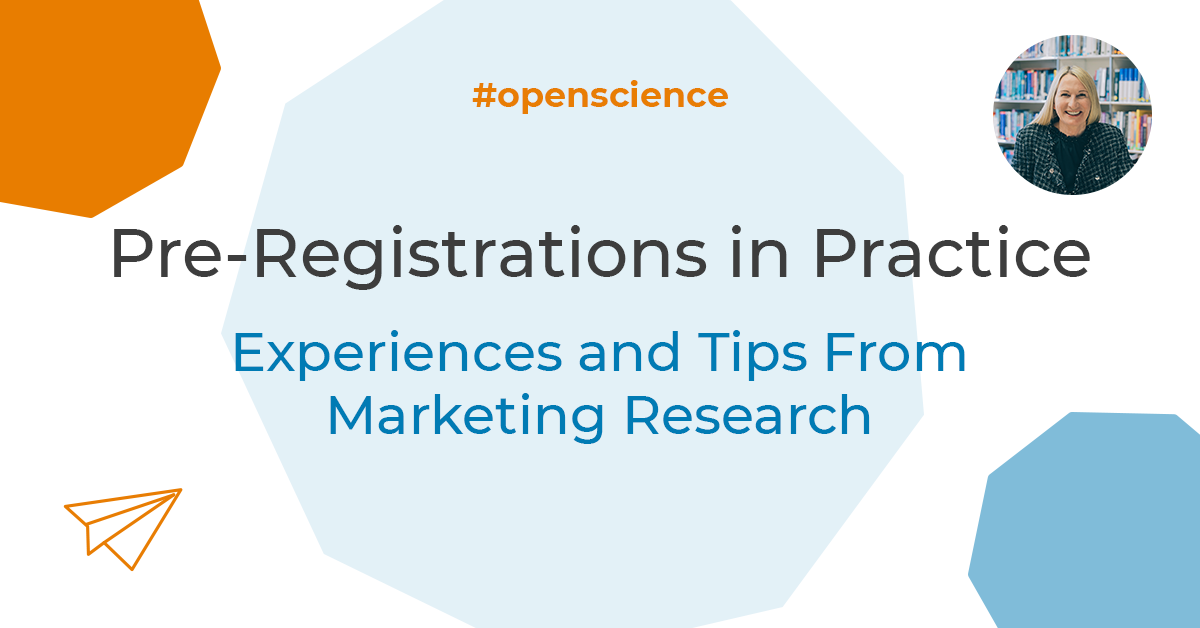How widespread are pre-registrations and what tips are there for carrying them out? Prof. Dr Sabine Kuester from the University of Mannheim gives an insight into her experiences in marketing research.
In a pre-registration, researchers deposit important information about a planned study in a public register before they start conducting it. The Open Economics Guide contains background information on this, for example on the benefits of pre-registrations and how pre-registrations work.
Prof. Dr Sabine Kuester holds the Chair of Marketing & Innovation at the University of Mannheim. In this interview, she talks about her experiences with pre-registrations, including from her perspective as an associate editor and reviewer.

How widespread are pre-registrations in marketing research from your point of view?
Pre-registration is not yet as widespread in marketing research as in some other scientific disciplines, such as psychology or medicine. Nevertheless, there is an increased awareness of the importance of transparency and methodological rigour in marketing research. Some researchers and journals are actively campaigning for the introduction of pre-registration to address the challenges associated with p-hacking, publication bias and other questionable research practices. Nevertheless, the practice of pre-registration in international marketing research remains inconsistent.
According to a review of the submission guidelines for high-ranking journals in the field of marketing and consumer research, the necessity of pre-registrations is explicitly mentioned in only a few cases. However, reviewers in these journals generally expect empirical studies to have pre-registrations. It may be sufficient if not all, but at least some of the studies contained in the manuscript have been pre-registered. In journals that do not belong to the top group, the requirement for pre-registrations is generally lower.
In academic education, many supervisors encourage early career researchers to carry out pre-registrations. Young scientists in particular are increasingly turning to Open Science practices.
The acceptance of pre-registration in marketing research thus varies considerably between different disciplines and individual researchers. While some welcome the practice of the Open Science paradigm, others are hesitant due to concerns about the possible restriction of creativity or the flexibility required for exploratory research.
In contrast to the current practice of pre-registration, all high-ranking journals now require data sets to be available in repositories.
What problems with pre-registrations have you observed in your work as a reviewer?
In my role as a reviewer and associate editor, I have noticed that pre-registrations are now increasingly available for the empirical studies of submitted manuscripts. However, I have also noticed that pre-registrations are often not integrated correctly. For example, details on data collection are sometimes presented differently than they were intended in the pre-registration, without further commenting on these deviations. It also happens that the data collections are presented in a different chronological order than they were registered. Pre-registrations are generally more common in consumer research. In marketing strategy research, however, this practice is less common.
What tips would you give other researchers for carrying out pre-registrations?
During pre-registration, certain details must be precisely defined before data collection begins. This includes the research plan, hypotheses, methods and analytical procedures, dependent variables, sample size, approach to data correction, and so forth. Researchers must ensure that the pre-registration is coherent with the later published report of their study. If adjustments are necessary during the study, these must be documented transparently. It is also possible to indicate in the pre-registration that the researchers intend to conduct exploratory analyses. Pre-registration does not exclude the possibility of exploratory analyses, but the results of these analyses should be presented accordingly in the manuscript. When pre-registering exploratory analyses, it is not necessary to indicate which specific contexts are being considered.
It is advisable to obtain feedback from colleagues before finalising the pre-registration. This can help to identify any gaps or ambiguities.
We would like to thank Prof Dr Sabine Kuester for the interview.
Prof. Dr Sabine Kuester holds the Chair of Marketing & Innovation and is Director of the Institute for Market-Oriented Management at the University of Mannheim. Her research and teaching focuses on innovation marketing, marketing strategy and digital marketing management. She can be found on LinkedIn.
